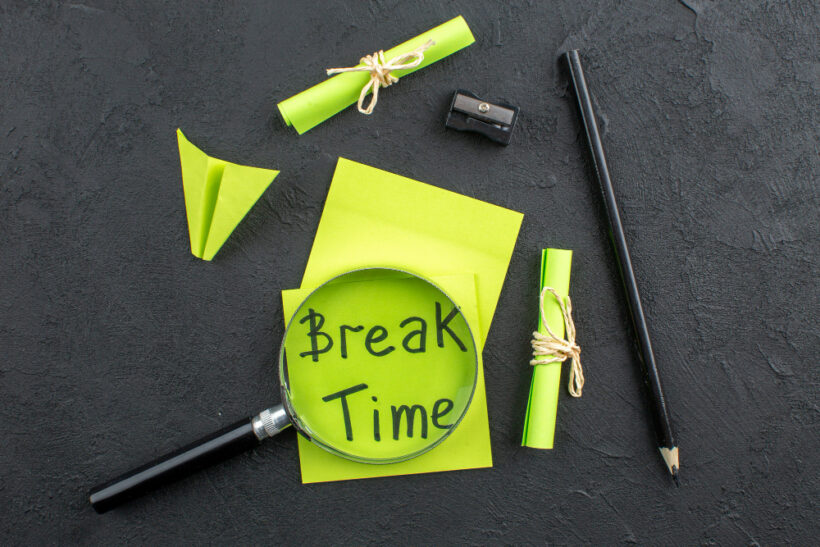In the contemporary work environment, where working longer hours and almost unanimous appeal to being constantly connected often gets the better of them, taking regular breaks would, quite logically and intuitively, appear counterproductive. From emerging research and practical experiences, though, breaks are not a luxury; they epitomize a necessity in maintaining high levels of productivity and overall well-being. This article talks about why regular breaks are important, how these improve productivity, and practical strategies to bring in proper breaks into your day.
Why Regular Breaks Matter
Help Improve Concentration: Performing an activity for long hours would only serve to decrease the level of focus and efficiency. Working continuously forces the brain to be in an active mode without a break for long, hence leading to mental tiredness. Regular breaks give you time to rest your brain and recharge it; hence, it keeps you away from losing concentration and sharpens mental clarity. Later, you can get back to work with freshened energies and be able to focus a lot better. Your efficiency improves in a way that reduces mistakes, and you are able to maximize outputs.
Avoid Mental Fatigue: It is a prevalent problem at work and more precisely when one needs to concentrate over long periods of time. If the person does not take breaks, the burden put on his head will increase and hence the tasks may appear harder and heavier than they originally are. Taking breaks brings relaxation from this kind of fatigue and lets your brain rest from work. Such rest is important in keeping the creative and problem-solving potential at their best level and will enable you to undertake the task at hand with fresh strength and vision.
The breaks reduce the levels of stress that are consistently high when one works for long hours without time off and might result in a burnout. A break allows you to break loose from work, be free, and engage in unwinding activities that give you the opportunity to let off steam. When you learn to manage stress, you will have an optimistic outlook, your mood will be lifted, and you will be productive for the hours that you put in at work. Frequent breaks would keep you away from the devastating impact of stress and maintain ecological mental and emotional balance.
Improve Physical Health: Long periods of sitting are extremely harmful and seriously detrimental to physical health through causing back pains, poor posture, and eye strains. Regular breaks stir up movements and physical activities that could help improve these problems. Minor activities like stretching, adjusting posture, or taking brief walks make a big difference in how you feel throughout the day at work. These regular breaks will make all the difference in keeping the risk of repetitive strain injuries to a minimum, besides other health concerns as a result of prolonged sitting.
Improve Creativity and Problem-Solving Skills: Many times, taking a break is to improve one’s creativity and problem-solving skills. You could be away from an activity, yet your subconscious mind keeps working on the material you have been handling. This subconscious mental processing sometimes brings in brilliant ideas that are unknown to a fully engaged mind. A change of scenery with a change of pace may spur creative thinking and lead to just the inspiration required for finding a way to surmount a difficulty.
How to Take Breaks Effectively
Pomodoro Technique: A modern technique of managing your time consists of working 25-minute work intervals, with 5-minute rest. After four “Pomodoros,” take a longer break of 15 to 30 minutes. This keeps the balance between concentrated work and rests, thus enabling sustained productivity over a period of time and reducing fatigue of the brain. Such regular intervals will manage it very easy to master time management and stay on top of things.
Take more frequent breaks: It is studied that taking more frequent, yet shorter, breaks is far more effective than longer breaks taken less frequently. You shall take a 5-10 minute break every hour that you work. In this time, get up, stretch your body, walk, or do anything other than work. Frequent breaks keep you away from burning out and maintain your energy level throughout the day.
Take Breaks and Move Around: Make the most out of your breaks to get moving. Even a trifle amount of exercise will help increase blood flow and cut down on muscle stiffness, which will be beneficial to your overall good health. Do some light exercises like stretching, yoga, or just take a little walk to freshen up the brain and the body. At this juncture, movement helps nullify negative effects associated with longer sitting, comforts, and increases productivity altogether.
Take a mindful moment: Try to spend the time at work on some relaxation techniques or mindfulness during one’s break. Deep breathing, meditation, or moments to relax are great ways that help one clear their mind out and remain calm. By being in touch with mindfulness at work in the breaks, one gains in emotional resiliency and builds wider scope for managing challenges on the work premises.
Environment Change: A change of environment on a break can be helpful. Sometimes, the mere removal from your familiar work environment, even when only in another setting for a short period, helps clear the mind. Take a short walk outside, visit another room in your house or office, or try working from a different view. A different view will recharge your thoughts, and you can return fresh, perhaps more productive.
Socialize or spend time with hobbies: You could utilize your time while on break either socializing or doing things you love. Such social interactions with coworkers, friends, or family improve the mood and develop closer bonds. Spending time on hobbies or other interests while on breaks develops creativity and relaxation; this helps restore energy and creativity.
Conclusion
Regular breaks are a salient factor in any productive schedule of work. It keeps one at a high level of focus, reduces stress levels, is good for health, and supports creativity. Employing different methods of taking breaks within the construct of your daily routine is sure to bring about better job performance, better health, and a more balanced method of dealing with work and life. Take more frequent breaks; let it be part of your productivity strategy and gain all the real benefits thereof.





